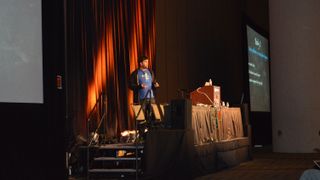Facebook wants you to game on mobile and on desktop
But it's got to convince developers first

"Cross-platform" typically carries connotations of jumping from iOS to Android to Windows Phone, but for Facebook's gaming arm, it has a slightly different meaning.
Aaron Brady, an engineering manager at the social network, made the case for game developers to produce titles for both mobile and "the Facebook Canvas," more commonly known as the desktop browser.
"Games are social, and Facebook is social," Brady told a room of developers at GDC, adding that the company wants to help devs engage more richly with the people playing their titles.
What's more, just as Facebook is pervasive in 1.2 billion people's lives, so too can games be anywhere and everywhere while driving revenue for the people who create them.
Play and pay
To make his case, Brady cited two studies conducted by Facebook that show cross-platform players "play more and pay more." Certainly music to monetization-minded devs.
Chief among the studies' findings was that revenue from cross-platform players was 3.3 times that of revenue for desktop-only users. Engagement also sees a 40% increase when mobile is played in tandem with Canvas. Engagement takes an 8% dip "with people who stuck to mobile only."
Facebook told TechRadar that its push for cross-platform game development is based at least in part on the company's findings that this kind of gaming monetizes well. A spokesperson declined to give specifics on cross-platform usage numbers.
Get daily insight, inspiration and deals in your inbox
Get the hottest deals available in your inbox plus news, reviews, opinion, analysis and more from the TechRadar team.
We also asked for the most up-to-date figures for mobile game usage, but were told more stats and details are due during a Facebook talk Wednesday.
Tune back to TechRadar for all the latest from Facebook and others during the rest of this gaming-filled week!
Michelle was previously a news editor at TechRadar, leading consumer tech news and reviews. Michelle is now a Content Strategist at Facebook. A versatile, highly effective content writer and skilled editor with a keen eye for detail, Michelle is a collaborative problem solver and covered everything from smartwatches and microprocessors to VR and self-driving cars.
Most Popular



